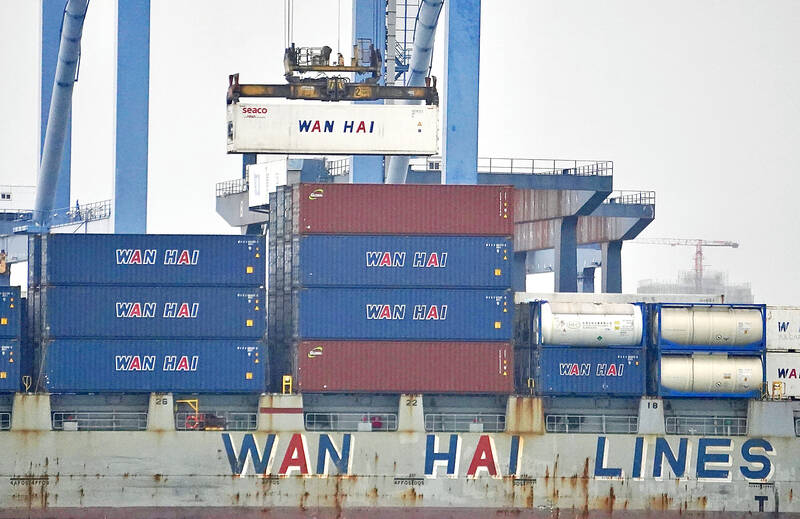The Taiwan Institute of Economic Research (TIER, 台灣經濟研究院) on Friday kept its forecast of Taiwan’s economic growth for this year at 3.15 percent, the same as its previous forecast in November last year on the back of stable consumer spending and investment.
However, the situation in the Middle East, the price of raw materials, the economic outlook in China, consumption momentum in the US and the monetary policies of major central banks would affect Taiwan’s trade and investment, the institute said at a forum on economic and industry trends.
Despite a decline in overseas orders, imports and exports for the first three quarters of last year, Taiwan could see a revival in external trade this year, the institute said, citing an expected global recovery in commerce and rising demand for semiconductors.

Photo: CNA
Taiwan’s exports and imports are forecast to grow at 6.34 percent and 7.68 percent respectively this year, 1.31 and 2.24 percentage points higher than its previous forecast, the institute said.
The semiconductor industry is expected to see a full recovery only in the second half of the year, due to the slow recovery of IC design and manufacturing, it said.
As for domestic demand, sales in the retail and hospitality industries reached new highs last year, an indication that private consumption momentum remains strong, despite price increase pressure in the service sector, it said.
The institute predicted annual growth of 1.95 percent in the consumer price index this year, up 0.15 percentage points compared with its previous forecast.
In addition, other surveys conducted by TIER have shown that workers in the manufacturing, service and construction industries have a positive view of the economy, which is also a sign of recovery, TIER Economic Forecasting Center director Gordon Sun (孫明德) said at the forum.

When an apartment comes up for rent in Germany’s big cities, hundreds of prospective tenants often queue down the street to view it, but the acute shortage of affordable housing is getting scant attention ahead of today’s snap general election. “Housing is one of the main problems for people, but nobody talks about it, nobody takes it seriously,” said Andreas Ibel, president of Build Europe, an association representing housing developers. Migration and the sluggish economy top the list of voters’ concerns, but analysts say housing policy fails to break through as returns on investment take time to register, making the

‘SILVER LINING’: Although the news caused TSMC to fall on the local market, an analyst said that as tariffs are not set to go into effect until April, there is still time for negotiations US President Donald Trump on Tuesday said that he would likely impose tariffs on semiconductor, automobile and pharmaceutical imports of about 25 percent, with an announcement coming as soon as April 2 in a move that would represent a dramatic widening of the US leader’s trade war. “I probably will tell you that on April 2, but it’ll be in the neighborhood of 25 percent,” Trump told reporters at his Mar-a-Lago club when asked about his plan for auto tariffs. Asked about similar levies on pharmaceutical drugs and semiconductors, the president said that “it’ll be 25 percent and higher, and it’ll

CHIP BOOM: Revenue for the semiconductor industry is set to reach US$1 trillion by 2032, opening up opportunities for the chip pacakging and testing company, it said ASE Technology Holding Co (日月光投控), the world’s largest provider of outsourced semiconductor assembly and test (OSAT) services, yesterday launched a new advanced manufacturing facility in Penang, Malaysia, aiming to meet growing demand for emerging technologies such as generative artificial intelligence (AI) applications. The US$300 million facility is a critical step in expanding ASE’s global footprint, offering an alternative for customers from the US, Europe, Japan, South Korea and China to assemble and test chips outside of Taiwan amid efforts to diversify supply chains. The plant, the company’s fifth in Malaysia, is part of a strategic expansion plan that would more than triple

Taiwanese artificial intelligence (AI) server makers are expected to make major investments in Texas in May after US President Donald Trump’s first 100 days in office and amid his rising tariff threats, Taiwan Electrical and Electronic Manufacturers’ Association (TEEMA, 台灣電子電機公會) chairman Richard Lee (李詩欽) said yesterday. The association led a delegation of seven AI server manufacturers to Washington, as well as the US states of California, Texas and New Mexico, to discuss land and tax issues, as Taiwanese firms speed up their production plans in the US with many of them seeing Texas as their top option for investment, Lee said. The